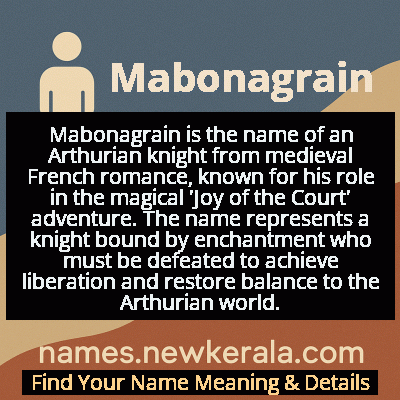Mabonagrain Name Meaning & Details
Origin, Popularity, Numerology Analysis & Name Meaning of Mabonagrain
Discover the origin, meaning, and cultural significance of the name MABONAGRAIN. Delve into its historical roots and explore the lasting impact it has had on communities and traditions.
Name
Mabonagrain
Gender
Male
Origin
Arthurian
Lucky Number
5
Meaning of the Name - Mabonagrain
Mabonagrain is the name of an Arthurian knight from medieval French romance, known for his role in the magical 'Joy of the Court' adventure. The name represents a knight bound by enchantment who must be defeated to achieve liberation and restore balance to the Arthurian world.
Mabonagrain - Complete Numerology Analysis
Your Numerology Number
Based on Pythagorean Numerology System
Ruling Planet
Mercury
Positive Nature
Adventurous, dynamic, curious, and social.
Negative Traits
Restless, impatient, inconsistent, prone to indulgence.
Lucky Colours
Green, white.
Lucky Days
Wednesday.
Lucky Stones
Emerald.
Harmony Numbers
1, 3, 9.
Best Suited Professions
Sales, marketing, travel, entertainment.
What People Like About You
Versatility, charisma, adventurous spirit.
Famous People Named Mabonagrain
Mabonagrain
Arthurian Knight
Central figure in the Joy of the Court adventure in Arthurian legend
Mabonagrain (Literary Character)
Literary Figure
Key character in Chrétien de Troyes' Arthurian romance 'Erec and Enide'
Mabonagrain (Mythological Figure)
Mythological Warrior
Represents the fusion of Celtic and French literary traditions in medieval romance
Name Variations & International Equivalents
Click on blue names to explore their detailed meanings. Gray names with will be available soon.
Cultural & Historical Significance
As a literary figure, Mabonagrain embodies the complex relationship between personal honor and supernatural compulsion that fascinated medieval audiences. His story explores the limits of knightly vows and the tension between individual desire and social obligation, themes that resonated deeply in the courtly culture of 12th-century France. The character's Welsh-sounding name suggests connections to earlier Celtic traditions, while his role in the narrative reflects the sophisticated literary sensibilities of the French court where Chrétien wrote.
Extended Personality Analysis
Mabonagrain exhibits the classic traits of Arthurian knighthood tempered by his unique magical circumstances. He demonstrates exceptional loyalty and commitment, maintaining his vigil with unwavering determination despite its personal cost. This steadfastness reflects the medieval ideal of keeping one's word regardless of consequence, yet his situation also reveals the potential for noble vows to become destructive obsessions. His character shows both martial excellence and a capacity for introspection, particularly as he confronts the consequences of his enchanted service.
The knight's personality evolves through his encounter with Erec, revealing layers of complexity beneath his initial role as a magical guardian. He displays honor in defeat and acceptance of his liberation, suggesting wisdom gained through experience. This transformation from bound guardian to freed knight illustrates the Arthurian theme of personal growth through challenge. Mabonagrain's character ultimately represents the balance between duty and freedom, showing how true chivalry involves both keeping commitments and recognizing when they have been fulfilled.
Modern Usage & Popularity
In contemporary contexts, Mabonagrain remains predominantly a name of specialist interest within Arthurian studies, historical fiction, and fantasy literature communities. Its usage as a personal name is extremely rare, limited primarily to families with strong connections to medieval literature or Celtic studies. The name occasionally appears in modern Arthurian adaptations, role-playing games, and as a reference in academic works exploring the development of knightly characters in medieval romance. While the recent resurgence of interest in mythological and Arthurian names has brought some attention to Mabonagrain, its length, complexity, and strong literary associations prevent widespread adoption. The name maintains a niche presence among enthusiasts seeking distinctive names with deep historical and literary roots.
Symbolic & Spiritual Meanings
Mabonagrain symbolizes the profound medieval concept of the bound knight—a warrior constrained by honor, magic, or vow to a specific duty or location. His story represents the journey from enchantment to liberation, serving as an allegory for personal transformation and the overcoming of self-imposed limitations. The character embodies the tension between noble obligation and personal freedom, illustrating how even the most honorable commitments can become prisons if not periodically reexamined. His eventual release through Erec's intervention symbolizes the medieval belief in the redemptive power of chivalric fellowship and the importance of community in achieving individual wholeness.

